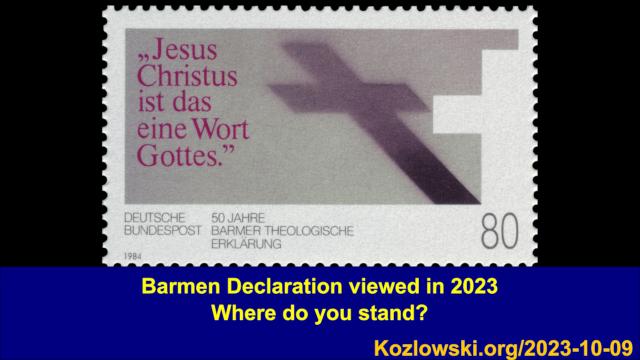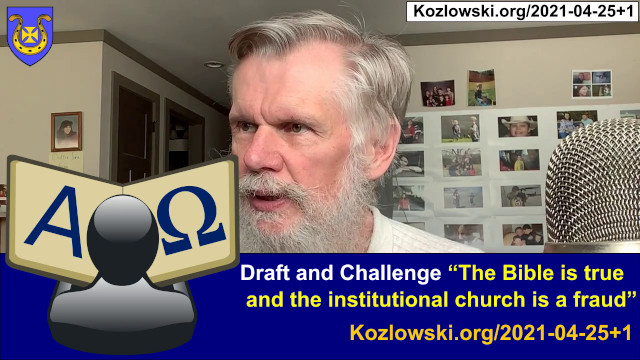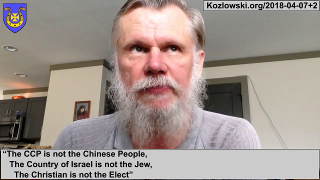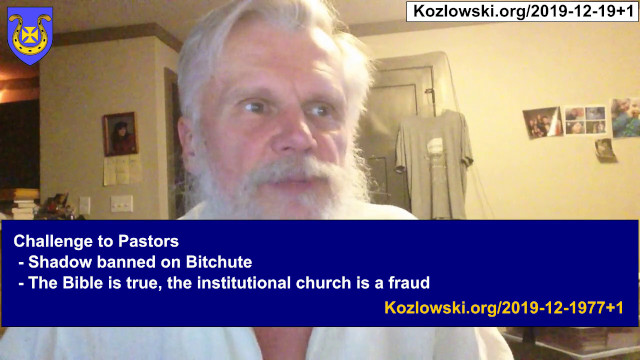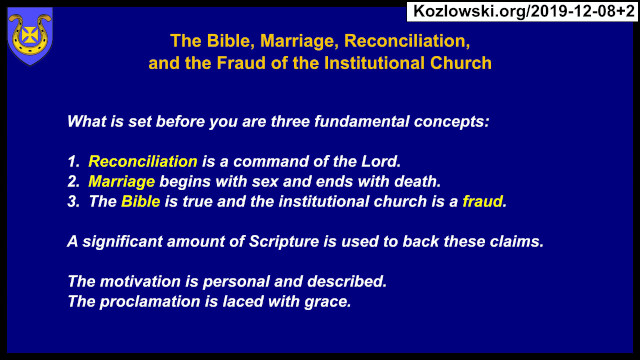|
|||||||||||||||
|
||||||
|
||||||
|
|
||||||
We tend to look at technology advances in recent decades and somehow think we are different than those of a hundred or a thousand years ago. We think little of the idea of getting on a plane to cross the Atlantic, but what was it like for those over 500 years ago setting sail with Columbus to cross a vast ocean without GPS or satellite maps? Who would take that risk today? Has the courage of man changed? Has the heart of man changed, or are we still focused on “the desires of the flesh and the desires of the eyes and pride of life” (1st John 2:16)? When we consider the Third Reich of the 1930s and 40s there seems to be a tendency to place all that is evil onto one man, Adolph Hitler, as if he alone had an unchallenged authority over all people in Germany. The reality is a bit more complex. Unlike the time of Columbus, we have a lot of direct evidence of what it was like to be in the culture of Germany in the 1930s, not just from history books, but directly from those who were there. When we think of 1492, the image of a guy wearing a hat that is currently not in vogue might come to mind. Those growing up during and serving the Third Reich are a bit more known to us today. In my case I call one of those people mom. Post World War I the German economy and therefore the German people were in difficulties. The causes, rightness or wrongness of either side of the first war matter little when people are hungry. People will often find relief in organizations that not only feed their stomach, but their pride, which returns us to 1st John 2:16. Collectives form and exploit the needs and passions of the people. The National Socialist German Workers Party became dominant and socialism put people to work and food on the table. But there was a cost. Socialism is just as strong today in the USA, but somehow we think we are not the same, even when we do the same thing. Beyond economics there is theology and noted theologians of German heritage. Martin Luther was much closer to the time of Columbus, however Dietrich Bonhoeffer and Karl Barth are from the Third Reich era, with Barth contributing to the Barmen Theological Declaration of 1934. Just as Luther attempted to stand on the Bible and not the doctrines of the dominant Roman Catholic Church, Barmen took the institutional church of the day to task with the same foundation. Is anything different in 2023? Consider point #4 which quotes Matthew 20:25-26 and I will include verse 27-28: 25But Jesus called them to him and said, “You know that the rulers of the Gentiles lord it over them, and their great ones exercise authority over them. 26It shall not be so among you. But whoever would be great among you must be your servant, 27and whoever would be first among you must be your slave, 28even as the Son of Man came not to be served but to serve, and to give his life as a ransom for many.” Barmen states: The various offices in the Church do not provide a basis for some to exercise authority over others but for the ministry [literally "service"] with which the whole community has been entrusted and charged to be carried out. We reject the false doctrine that, apart from this ministry, the Church could, and could have permission to, give itself or allow itself to be given special leaders [Führer] vested with ruling authority. What is being stated? The institutional church of the day, endorsed by the state, assigned to itself leadership titles and positions to exorcise authority over the people that the Lord does not grant, as the referenced Matthew 20 states clearly. So let’s make it all the more clear and see that it is a consistent message not only in the New Testament, but even back to Genesis 1. Where we see passages like “lord it over them” it comes from the Greek “katakurieuō” which is made up of “over” and “lord”, or simply “overlord”. Mark 10:42-45 is almost identical to Matthew 20 and we see the call to the follower of Christ is not to rule over, or be the overlord, but to serve as Jesus has set the model. We see this again in 1st Peter 5:1-3 with the idea of the duty, not title, of shepherd or to tend. Verse 3 states “not domineering over those in your charge” which is literally not being the overlord. Rather it is a consistent command to serve rather than be served. No title or authority is bestowed. We can see a contrasting passage in Acts 19:16 “And the man in whom was the evil spirit leaped on them, mastered all of them and overpowered them, so that they fled out of that house naked and wounded.” Where we see “mastered all of them” is the evil spirit becoming their “overlord”. This is not a position we want to be subject to, nor is there a model to impose this on others. We have no imperative to be the overlord of another man, but the Lord directly delegates to man to have “dominion over”, or take on the role of overlord of the earth, plants and animals in Genesis 1:28 “And God blessed them. And God said to them, ‘Be fruitful and multiply and fill the earth and subdue it, and have dominion over the fish of the sea and over the birds of the heavens and over every living thing that moves on the earth.’” The Lord directly delegates to man the role of overlord of the earth which allows us to carve a road and build a home. We are the overlord of the plants which allows us to farm for food, eat the harvest, and even plant a garden for the beauty of it. We are the overlord of the animals which allows us to use animals as beasts of burden, raise them for food and eat them. The Lord does NOT delegate to man to be the overlord of another man. We are called to submit to the state when imposed on us, such as seen in Romans 13, often referred to as the tyrant’s favorite chapter, but not called to set up a state. A state, leadership, or rulers are to meet certain qualifications as seen in Deuteronomy 17. Can you point to anyone besides Christ Himself who meets those qualifications? When man asks for a ruler, to be like the Gentles as seen in Matthew 20, the Lord states it is a rejection of Him in 1st Samuel 8. He then lists the costs of turning to a ruler ending with the sobering verse 18 “And in that day you will cry out because of your king, whom you have chosen for yourselves, but the LORD will not answer you in that day.” Many who subscribed to the concepts in Barmen paid a heavy price for their stand. However, it was not just the imposition of the state on those whose allegiance was to Christ alone, but their peers. A minority of institutional churches and individuals took unambiguous stands of allegiance to Christ or allegiance to the institution. The vast majority were ambivalent, just like in 2023. Is ambivalence a virtue, or simply cowardice? We gather at our ambivalent institutions on Sunday morning to hear that we must be obedient to the rules, as our leaders, religious and political, set before us. We celebrate that we do not murder, commit sexual immorality, sorcery, or idolatry, at least not overtly, to salve our conscience that the lake that burns with fire and sulfur is not something we have to fear. But that is described in Revelation 21:8 and the first groups that are described for the second death are the cowardly and faithless. There appear to be three groups. Those who trust in the Lord alone, those who trust in an institution, and the largest being the ambivalent or cowardly. It may be easy to think that those with least hope are those with misplaced trust, but the ambivalent or cowardly, who are many, might be heading through the wide gate and the easy way that leads to destruction (Matthew 7:13). However, those with a misplaced trust, at least have a trust. They need a correction on their direction, but at least they are moving, not in static ambivalence. We have examples of those with misplaced trust being embraced and corrected by the Lord. Some might hear “Saul, Saul, why are you persecuting me?” as the Apostle Paul did in Acts 9:4. Or we may be in the right direction but need refinement, as happened to Apollos in Acts 18:26. We often find those who are an integral part of the institutional church, become some of the greatest challengers to the hierarchy. We see that with John Wycliffe in the 1300s, Jan Hus in the 1400s, Martin Luther in the 1500s, Bonhoeffer and Barth in the 1900s, and does that include your name today? While the call to trust the Lord alone and not the institution is clear, our trust remains weak at best. We see the father appeal to Jesus for his son’s healing in Mark 9. When in verse 24 the father states “I believe; help my unbelief!” do we see our own weakness? When we read about the Apostles in Luke 17:5 state “Increase our faith!” are we of the same mindset? Do we see the same weakness is us? When was the last time you saw a tree being uprooted and planted in the sea? We read Jesus state in Matthew 17:31 and Mark 14:27 “You will all fall away, for it is written, ‘I will strike the shepherd, and the sheep will be scattered.’” We see this happen by the Apostles at the crucifixion. We see the Apostles who spent years face-to-face with Christ hide in fear in John 20:19. It was not the faith of the Apostles, but the grace of the Lord that as seen when Jesus went to them. It was not the wisdom of Thomas, the guidance of religious leadership, but the grace of the Lord seen in verse 28 when Thomas declares Jesus as “My Lord and my God!” It is so easy to look at those ensnared by the Third Reich and think we are different. Are we? Are you enticed by the worldly benefits of the institution? Does the pride they offer consume you? Is it OK to do just a little misdeed as it is minor compared to “those people”? Are the issues before you too trivial in your mind to make a fuss about? Do you have the faith to state that directly to the Lord? If no one else is questioning what is going on, is therefore your conscience clear? Are you willing to “throw in your lot among us; we will all have one purse” (Proverbs 1:14) because that is what we do? Somehow, our case is different. We are OK. Our leadership says so. What does Jesus say? Are you enslaved to the law as seen in Galatians 4? Are you a son of the slave woman or the free woman? Chapter 5 starts with “For freedom Christ has set us free; stand firm therefore, and do not submit again to a yoke of slavery.” Are you enslaved to an institution? Or you set free by Christ? |
||||||
|

